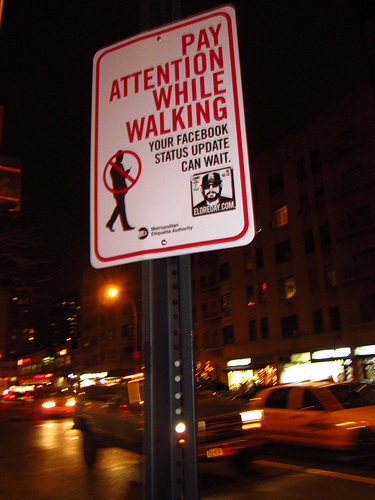Proper etiquette shouldn’t only be practiced when we relate to people on a daily basis. And good manners shouldn’t only be displayed when we sit down and have a meal at the table.
A lot of people don’t think much about blogging etiquette and what it means to be a successful blogger with good relationship skills. But good manners and proper conduct should apply to everything we do in life. Not just so that we can be a good example to our children and others, but because it’s the right thing to do. And there are some general blogging etiquettes that everyone should follow — especially when you are just starting out.

photo credit: *Bitch Cakes* via photopin cc
- Don’t swipe images
If you see an image on someone’s blog that you want to share and you just insert the URL into your post instead of directly uploading the image into your blog, you are fundamentally stealing bandwidth and most bloggers really don’t like it. The right thing to do would be to right-click on the image that you want to use in your blog, assuming that the image can be redistributed, and download it into your computer. Once you have done that, you can upload the image into your blog. And don’t forget to credit the source or owner of the image. If there is a copyright under the photo, that usually means you can’t use it. But there are great sites like SXC.hu and Photo Pin with tons of free images you can use. - Giving credit for ideas
If you stumble upon an idea from another blog or site that you also want to discuss in your own site, make sure to give due credit by pasting a link of the site or blog where you originally got the idea. This includes ideas from other blogs that you scooped up, recycled and expanded upon. It is your responsibility to give credit to blogs/sites that have inspired the contents of your own blog, just as you’d want someone else to let their readers know if they like your idea and grabbed it. You don’t want to be accused of stealing or plagiarism — and it’s just good link love practice so give credit where credit is due. - Your blog is your home
Treat your blog like it is your home. Just as you want your visitors to respect your home (your blog), you also need to give the same respect to them when you visit the blogs of others. Avoid leaving mean and disrespectful anonymous comments. Not only is there a way for another blogger to find out your IP address, there is also a way to find out where you come from. So if you want to live peacefully, be decent and respect all the other bloggers that you come across with. It’s ok to disagree with someone and to say so, but there’s no need to grow “internuts” and go postal on someone just because you’re having a bad day or you thought their ideas weren’t so grand. Sometimes it’s just better to say nothing at all when you have nothing nice to say. - Responding to comments
You may not have the luxury of time to reply to all the comments being posted on your blog, but if you see a meaningful one (one that compliments you or asks a question), then do your best to respond quickly. You don’t want your visitors to think that you are a snob or ungrateful of their support. So take some time each day to just respond to comments that need to be recognized and appreciated, even if it’s only 15 minutes a day. - Deleting comments
When you have a blog, you have to be prepared for visitors that do not always agree with you. If there is a comment that doesn’t sit well with you, just leave it. Sometimes comments can lead to discussions and that is a very good thing. Remember though that you have the right to delete inappropriate, rude or nasty comments if you wish; especially if they attack you or other readers. - Spamming
When you visit another blog and simply post a link to your blog as a comment without any other content, think twice. The blogging society considers that spamming and you do not want to be known as a spammer. When you comment, make sure that it has valuable and relevant content. Social networking sites mostly work on computer algorithms that have the capability to detect spam. If the comments you posted do not contain a healthy mix of other thoughts besides your link, it can easily be considered a spam. When you promote other people as well and use commenting to establish connections, it will give you more success. - Limit pop-ups
It can sometimes be annoying and irritating for visitors of your blog if a lot of pop-ups keep showing up. Many bloggers see this as a way to entice visitors to sign up to a mailing list or view a special offer, but there are times when this can be too aggressive and not even necessary. You don’t have to eliminate popups, but try to make them visually appealing, relevant to the content and keep them to a bare minimum. - Reduce ads
Most bloggers are thrilled about the idea of being able to use their blog to make money — or at least direct more traffic to their money-making ventures with their blogs. But filling up your posts and pages with ads is a big distraction that will often cause readers to leave quickly. There is a way for you to put ads into your blog and show these ads only to search engine traffic visitors. For those people who type in your address directly, less ads are shown. Another advantage to this is getting higher click through ratio on your ads since it is available to general visitors, who are more likely to click on them. This results in higher payouts by Google. - Notifying Blogs
It is not an obligation for you to notify a blog if you link to them. In fact, they should be thankful because you’re giving them exposure. On the other hand, if you use their images, artwork, photographs, or other content it is a good idea to ask for permission first by posting in their comments and always remember to check or fair use rights. Notifying a blog or website that you’ve used their content can also allow you to open up communication with other bloggers as well. - Emailing bloggers
Do not send mass emails to bloggers or contacts about contests, promos, etc., especially if a certain person is not specifically signed up on your email list. It can potentially land you in the spammer list which can lead to your email address and domain name being blacklisted. It’s not only very bad blogging etiquette but could potentially ruin your blogging reputation. - CAPTCHAS
Alright, this one really isn’t considering good manors in blogging, it’s just downright annoying and a general pet peeve of mine. CAPTCHAS (those wildly annoying and impossible to read computer generated images that let you submit a comment on someone’s blog or sign up for something online) are usually used to keep spammers and bots from leaving a bunch of bogus comments on your blog. Blogger blogs especially love these. But there are other filters built into most blogging platforms these days which catch the spam. And if they don’t, move your blog to a real platform like self-hosted WordPress and use Akismet — it’s awesome and no CAPTCHA is required.
What are things you consider important when you visit blogs or that you’ve discovered while blogging/running a website yourself?




This is an excellent list. I agree with the one about respecting people on their blogs, I hate it when you get rude anoymous comments. There is just no need for that at all. Also, CAPTCHA is literally the worst. I hate it so much I am using CAPTCHA bypass browser extension software called RUMOLA to read them and fill them in for me! Has definitely made blogging a more pleasant experience (as it should be!) instead of feeling my blood pressure climb every time i see one of those boxes of spaghetti that is meant to be words!
Thanks so much, Alicia!
I think some people crawl around the internet trying to stir up trouble. Most of the time, you just have to ignore the trolls and go on with life. They’re not anyone who you need to worry about when it comes to valuing people’s opinions.
That’s a very handy little browser extension, too. Have to admit I’ve never heard of it, nor did I even think of that. 🙂 Thanks again for the tip!!